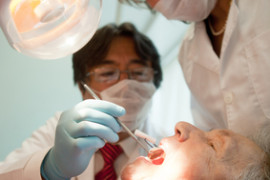Coronary heart disease (CHD) patients’ risk of death increases with every tooth lost, according to a large cohort study published in the European Journal of Preventive Cardiology.
The study, which followed over 15,000 patients with coronary heart disease from 39 countries, took place over nearly four years. Researchers found that tooth loss was directly associated with an increased risk of heart attack, stroke, cardiovascular death, and all-cause death. Increase in number of teeth lost was associated with an increase in poorer outcomes, and patients who had lost all of their teeth had nearly double the risk of death as those with most or all of their teeth.
The European Society of Cardiology broke down the study’s figures:
“After adjusting for cardiovascular risk factors and socioeconomic status, every increase in category of tooth loss was associated with a 6% increased risk of major cardiovascular events, 17% increased risk of cardiovascular death, 16% increased risk of all-cause death and 14% increased risk of stroke.
Compared to those with all of their teeth, after adjusting for risk factors and socioeconomic status, the group with no teeth had a 27% increased risk of major cardiovascular events, 85% increased risk of cardiovascular death, 81% increased risk of all-cause death and 67% increased risk of stroke.”
Interestingly, these results come from a study which evaluated the effects of the drug darapladib on Lp-PLA2 levels. Lp-PLA2 is a known player in heart disease and Alzheimer’s disease that is affected by periodontal disease. Darapladib ultimately failed to reduce Lp-PLA2 in Phase III clinical trials. Pathogen-directed periodontal therapy, however, has been shown to lower Lp-PLA2 levels 30-37%.
Thanks to groundbreaking research, we have a good idea of why periodontal disease and cardiovascular disease are connected. Periodontal pathogens are linked both directly to disease progression within the heart and blood vessels and indirectly to increases in cardiovascular risk factors like blood pressure and systemic inflammation. And while studies about the mechanisms behind this relationship give us the “what” to go after, it is studies like this one, which show the real-life human impact, that give us our “why.”
Source: Tooth loss is independently associated with poor outcomes in stable coronary heart disease



